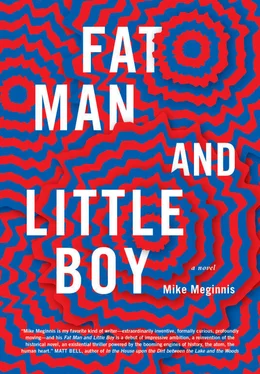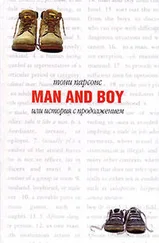“Did she suffer?” Masumi asks the brothers. “I don’t know anymore. I can’t see. But now she’s free, and so are all the rest you trapped in there. They’re all free to haunt you.”
Before stumbling back to his cabin, Masumi screams that he’ll kill the brothers. He says he’ll tell the world who they are. He says he’ll reveal them. He says he’ll get his gun back from the fat man. He says all the hotel babies will grow up to know Fat Man and Little Boy, and that they will continue to recognize them, and be drawn to them, and look at them with so much love, and someday the brothers will have to admit and explain what they are, what they were, what they always will be.
The next morning, Rosie leaves a note in an envelope wedged under the door of Mr. Wakahisa Masumi and Mrs. Wakahisa Masumi. The letter demands that they leave. It threatens the full force of the law. It advises them a car has been hired to drive them wherever they wish the next morning. It offers the widow’s condolences for Masumi’s brother, included at Fat Man’s insistence. It thanks them for their contributions to the hotel community, especially in languages, where Mr. Wakahisa Masumi’s skills are commendable. His drinking, however, gives the widow cause for concern. Mrs. Wakahisa Masumi would be wise to make him see an expert next time he has a spell.
Mr. and Mrs. Wakahisa Masumi take the car. No one sees them go; it is dark when they leave. Their cabin is pristine. There is some concern in the community at their passage, that this might affect the influx of souls into bodies—into babies, that is: and babies into mothers.
Fat Man and Little Boy mourn the tree for several days, loading its wood into a wheelbarrow, rolling it out of the hotel grounds, and dumping it into the river, which carries it away, out of sight. They see a turtle’s head bobbing in the river. See water bugs on the surface.
Little Boy says, “Why was he always so mad at us?”
Fat Man says, “You should know.”
For a long time, Fat Man lives in fear of Mr. Bruce and Mr. Rousseau’s return. It seems impossible to him that they should really try to track down a hundred thousand dead women, all of them pregnant, all of them pretty. The definitions of both words would have to be stretched beyond all recognition. Still, they don’t come after one year, and they don’t come after two, and he begins to think they never will. He begins to think he’s safe.
It makes him feel ill to be safe.
Rosie asks him, a few months after the once-police have gone, what made them take an interest in the first place. “Are you guilty?”
“Yes. But not of what they say I am.”
“What have you done?”
“My life is built on the destroyed lives of others. It’s built on death.”
“That’s all of us,” says Rosie.
And the sun rises yellow, and the sky is clear. The grass tilts in the breeze, and people forget the war, or they remember everything else. There are no more secret cabins. Fat Man and Little Boy still share one. Rosie has her own, where she spends most nights alone. The excess Jew things are kept in the museum cabin, or they are sent to relatives who write to ask for them, or they are sent with relatives who visit. Some—the really worthless things, the broken cups and frayed shoelaces—are simply thrown away. They no longer bring Fat Man comfort.
Ivy finds the cabins and begins to climb. Fat Man offers to scrape it away. Rosie says the land is making them welcome. She says to let it be.
And the guests summer in Gurs with their children, and the children grow. They love the fat man and his nephew, but also other things: their mothers, their fathers, dessert, games, and some of them the library. Rosie buys picture books.
They are not like the piggies or knots of piggy-flesh. They are strong, they are quick, they are some of them beautiful, they are some of them plain, they are some of them quite ugly, but all of them complete.
And cicadas hide in the trees, and gnats swarm wherever there is damp. Fireflies in the summer. The children jar them as their parents did before. The jars glow. Some forget the air holes. Their fireflies die. Others remember; theirs live a little longer. They rinse the bodies and the grass out of the jars into the river. When it rains Gurs smells of chocolate. When it’s dry the hotel smells of grass. There are wild strains of it among the rest. Blue-tinted blades, and red. Fat Man wonders sometimes how they came to be here. The ivy climbs the walls very slowly. Sometimes it seems you can hear it.
Fat Man ages, or seems to. He fattens, slowly. Lines crease his face. They might be only fat folds. His body slumps around him, he is surrounded by it. His arms hang heavy, his wrists’ fat threatening to consume his hands, which remain their same size, his fingers at some theoretical horizon of their swelling. His palms remain black. His thighs rub together when he walks. He powders them to limit chafe.
When he and the widow make love she mounts him. He lays back and pulls his stomach out of her way like a curtain.
She had to tell him seven times—in her straining, whispering way—that he was “so big” before he understood it was a compliment.
Sometimes she faces away when she mounts him, nightgown gathered up around her waist like a sash. He doesn’t know if she closes her eyes. If not, then what does she look at? If so, then what does she look at?
Little Boy does not grow. He does not grow older. They have a fifteenth birthday party for him; he blows out the candles. He blushes. He says, “You didn’t have to.” They have a sixteenth birthday party for him. He blows out the candles. He blushes. He says, “Haha. I guess I’m a runt.” None of his friends from school attend because he doesn’t have them anymore. He runs and plays with the children of guests afterward—children three, children four. He seems happy this way.
Rosie says they need to take him to a doctor.
“He’s just a late bloomer,” says Fat Man.
“He looks like he’s nine. When did he last grow even an inch? He’s been exactly the same since the day I met you.”
“So he’s a little stunted. There’s nothing wrong with that.”
“Maybe he’s a dwarf.”
“Dwarfs don’t look like he does. They’re squat, and their arms don’t work right. I promise he’s fine. If he doesn’t grow soon I promise I’ll take him to a doctor.”
There is a whole week where Fat Man forgets he was ever a bomb. It comes back to him in the night. He is looking at the other side of the door’s frame while he smokes a midnight cigarette in the cabin’s open doorway, his back propped up against the side with the hinges. It occurs to him he hasn’t been thinking of himself as a bomb. It occurs to him he was one.
It occurs to him you can never be consciously innocent. You only really know what you’ve done wrong. This is partly because there is so much you haven’t done there is a boundary on how much and how often you can think of it. He is innocent of rape. He is innocent of gossip. He is innocent of kidnapping. He is innocent of child molestation.
To recite one’s innocence, he thinks, degrades it. A list of what he hasn’t done becomes a list of things he could do. The rest, the things he hasn’t considered or even imagined, are an abstraction. This is innocence. This is the look in Little Boy’s eyes, as he does not grow, but grows apart from Fat Man—the milky white, the perfect fog of innocence. Little Boy doesn’t know what he could do. He doesn’t see how he could hurt all the people around him.
There is a day a year later when Fat Man forgets—for that day, he is only John.
Another month, there are two weeks.
One day, there is an hour.
It always ends the same way. The chill, the ache, the lurch of remembering, of coming up short, of realizing he hasn’t been thinking of himself as himself. He wonders, after the fact: While I didn’t know, was I happy? Was I any happier at all?
Читать дальше












